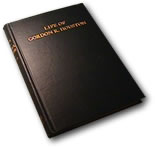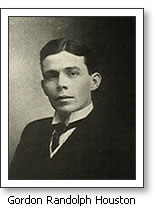| |
My mother recently encouraged me
to read a little book on the life of Gordon Randolph Houston—one
of my great uncles. The sickly son of a missionary to China,  whose
mother died at an early age, Gordon never allowed his infirmity
and personal struggles to get in the way of his relationship with
God and other people. whose
mother died at an early age, Gordon never allowed his infirmity
and personal struggles to get in the way of his relationship with
God and other people.
As I read, I was challenged by the
his love for the LORD and the way in which he sought to meet the
needs of other people. He had a unique ability to love those around
him regardless of their sinful condition before God.
A very talented young man, he could
have easily served much larger and more well known congregations
than he did, but he followed God's specific call for his life
and ministered in small towns on the frontier of America.
An ordained minister, he was careful
not to let even this get in the way of his relationship with others.
His gentleness and humility are especially prominent in the following
excerpt from a letter to young person:
|
"I trust the little book may help you
to come to a decision. I will be pleased to try to explain
any questions which may make you hesitate, and I hope you
will feel at ease to talk about the matter. Don't be skeered
cause I'm a preacher, because you see I'm not one of the
great big ones with whiskers and specks, but just your friend
and Christ's friend, and I would so much like for you to
come to his house and number yourself among those who feel
their debt to him…"
|
Gordon never judged another
person for unbelief, nor did he seek to heap condemnation upon
another individual because he was doing what was wrong. Instead,
Gordon sought to live his own life as an example of holiness and
purity which often in itself was enough to produce lasting change
in the lives of the individuals he met. Though he had high standards
he was never hindered by those standards in reaching out to others
with the love of God. He was genuinely concerned about their lives,
and this came through even when he was totally against what they
stood for.
For example, Gordon was passionately
for the prohibition of alcohol. At his time saloons and alcohol
were a great temptation to those living far away from society.
Often, dances held in saloons were the only source of social activity
for young people in a town. In order to meet this need, he established
reading rooms with good reading material in each of the towns
he ministered. At night and on weekends the young people were
able to come and play games and enjoy healthy entertainment with
one another. He also encouraged many of the men around the town
to come over to his house and enjoy fellowship with him whenever
possible. Not only did he seek to establish good activities for
the people of the town, but he especially sought to reach out
to those who were heavily involved alcohol—especially the
saloon keepers as seen in the following story:
|
"In illustration,
we find that often he would drop into the saloons at Clatskanie,
either for a friendly chat with the keeper, or to inveigle
some man he was working with, out of the same.
"One day while casually reading his
newspaper in one of the saloons, the proprietor finally
said: 'Look here, I don't see what it is that brings you
in here when you are so opposed to my business.' To this
Mr. Houston's reply was, 'Certainly, man, I am not interested
in your business, but say, I am interested in you and your
children.' This was the opening wedge in winning the man's
respect. The result was, that the man shortly afterward
disposed of his business and moved his family out on a farm
and so showed that he regarded his family's welfare as his
chief concern."
|
Though his activities often brought him in contact
with questionable people, he continued to reach out to the lost
and hard to reach. I was especially touched by the following anecdote
regarding his influence over a blacksmith who was heavily involved
in alcohol:
|
"The winning of this man had been the
result of a long, long siege, and may the passer-by of the
shop wondered why he should so often see 'the preacher'
there—looking on or jesting or back in the adjoining
home, lightening the heart of the good wife. 'Why' became
finally evident and a sermon on "The Laboratory Test
of Christianity" on the text of John 7:17 found apt
illustration in this man's redemption…"
|
You see Gordon had come to realize that the goal
was the man's relationship with the LORD. He pressed toward this
mark with great fervor, and did not make the mistake of trying
to reform the sinner without the work of Christ. This is well
illustrated in a sermon of his based on Matthew 7:1. Here are
his closing remarks:
|
"The Pharisees
in thus looking upon the multitudes saw publicans and sinners.
To the Master, however, they seemed rather as sheep not
having a shepherd. And if our hearts are filled with love
for the people around us, we will look upon them as lost
sheep, rather than as publicans and sinners. We will seek
to hide the faults of people rather than to parade them,
and if we are called by duty to speak of them, it will be
with the tone of pity rather than pleasure.
"My friends, this
is the most severe test that our Christianity has to stand.
Who here can say that even in the last week he has never
spoken of his brother except in love? Who in the audience
to-day can say truthfully that every opinion he has expressed
has been guided by kindness? If there be such a person,
James tells us that 'he is perfect and entire, wanting nothing.'
We need to exert every power of heart and body to master
ourselves in this and then we shall fail if we do not trust
implicitly in the power of the Holy Spirit.
"He is able to
keep us from stumbling, but we must submit to him unreservedly.
Seek to guide men by developing their good qualities rather
than by condemning their bad. Think of every man as a 'brother
for whom Christ died,' and you, too, will be the more willing
to die for him. Try to see amid every man's faults, those
finer qualities which would make him a useful man to the
community, if only they were given the right of way. In
the foibles and weaknesses of our acquaintances, let us
speak in the same consideration in which we would of our
brother. Be kindly affectioned one to the other. Judge not."
|
Gordon Randolph
Houston died in his mid-30's of tuberculosis. He lived in poor
health most of his life: experiencing back trouble and problems
with his lungs. Even so, he had great impact on the world around
him. Though he was only a pastor for a few short years, he directed
three different churches across the Northwest. In each, he sought
to reach out not only to his congregation, but also to the entire
town.  When he died many people sent letters or tokens of appreciation
back to his family. Though his life was cut short by disease and
weakness, it was multiplied through his generous and loving spirit.
He had truly been blessed with a heart that was able to love the
sinner, but not reject the sin.
When he died many people sent letters or tokens of appreciation
back to his family. Though his life was cut short by disease and
weakness, it was multiplied through his generous and loving spirit.
He had truly been blessed with a heart that was able to love the
sinner, but not reject the sin.
He is an example of one, to me, who
let his light so shine before men, that they might see his good
works and glorify his father in heaven. I
am encouraged then to apply his example to my own life. Too often,
I have not been like Gordon, too often, I have crusaded against
the darkness—condemning it with all that is within me. What
I am realizing is that Christ desires to shine through us into
the lives of others, instead of condemning the darkness we need
to be light. When you turn on a light in a room the darkness vanishes.
People need others to allow Christ's light to shine through them.
I love the quotation from Matthew 5 of "A city that is set
on a hill cannot be hid." When Christ is burning in our hearts
and lives, he will shine forth in our relationships to others.
The way we live, is perhaps the greatest testimony to power of
the love of God to change a life.
"A city
that is set on an hill cannot be hid. Neither do men light a candle,
and put it under a bushel, but on a candlestick; and it giveth
light unto all that are in the house. Let your light so shine
before men, that they may see your good works, and glorify your
Father which is in heaven."
Matthew 5:13-16
The book Life of Gordon R. Houston
by William M. Case was published by the Presbyterian Committee of
Publication, Richmond, Va. The photo and sections in gray are taken
from the book.
<< Back to Articles
|
![]()
